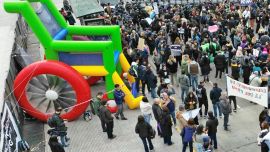Restaurant employees, dog-walkers, garbage recyclers, construction workers and many more Argentines found themselves unemployed overnight when the coronavirus pandemic arrived in Argentina. Many have had no other recourse than working for low-paid home delivery services or relying on state subsidies in order to survive.
"The main alternative for precarious jobs was state aid but everybody’s situation got worse. Many of the formally employed suffered wage cuts while others saw how their companies closed down," said Ezequiel Barbenza, a professor at Universidad del Salvador.
Gustavo, 23, worked at "El patio de los lecheros," a popular night-time and weekend spot where food trucks parked up and served customers. When the lockdown began in late March, its owners decided to switch to using the Glovo app to offer home delivery.
"But that only lasted a month. It didn’t work out because El patio de los lecheros was all about the atmosphere rather than the food," recalls Gustavo, who asked for his surname to be withheld.
"Out of 180 employees, barely 20 had a formal contact. We were left empty-handed," he said.
This young Venezuelan, who arrived here last year after fleeing the crisis in his homeland, then switched to delivery jobs for the Rappi app.
"Getting another job was very difficult. Delivery is the simplest option for an immigrant," he concludes.
'Few barriers'
Home delivery platforms are booming in the midst of the pandemic with increased demand for the service and people lining up to do the work.
"It’s the kind of work which was declared an essential activity in the quarantine," explains Javier Madariaga, an economic researcher at the CIPPEC (Centro de Implementación de Políticas Públicas para la Equidad y el Crecimiento) think tank and an advisor of the Inter-American Development Bank (IDB, or BID in its Spanish acronym).
"These apps have very few barriers to entry. There is no selection process to define the most suitable candidate – with minimal working capital [a mobile telephone, a data plan and a bicycle] you can start earning immediately," he indicates.
A study directed by Madariaga in 2018 established that in Buenos Aires, 80 percent of work from delivery apps was performed by recently arrived Venezuelans. Now it is estimated to be half and half between immigrants and locals for an activity whose workers are considered self-employed with no social security.
"For immigrants it’s the first option while for Argentines it’s the last. But they’ll take it if they lose salaried employment," concludes the economist.
'No work here'
Julia, 52, a domestic service employee, stopped working at the start of the lockdown. Her husband and her son are both construction workers and both have been jobless for the last five months too. Julia continues to be paid by the house where she worked twice a week but not by the office where she was an informal cleaner. It since has closed down.
She has twice received the IFE (Ingreso Familiar de Emergencia) emergency family benefit of 10,000 pesos, introduced by President Alberto Fernández's government to help informal workers.
Living in Merlo in Greater Buenos Aires, none of the family has tried to seek some other activity.
"To work you have to go to the capital but we have no way of using public transport," says Julia, referring to the sanitary restrictions.
"There’s no work here in the province," she explains.
Unemployment was 10.4 percent in the first quarter of this year but hundreds of thousands of jobs are estimated to have been lost since then.
A IDB report forecasts that the crisis occasioned by Covid-19 could trigger the loss of up to 17 million formal jobs in Latin America.
'Very big universe'
Barbenza maintains that the pandemic has highlighted the scale of precarious employment in Argentina.
"IFE was initially aimed at around three million people, 12 million registered and nine million were selected. This reveals a very big universe of precarious employment" in a country of 44 million inhabitants, he points out.
Barbenza stresses that this precarious nature has deepened in both urban and rural employment with family agriculture suffering especially in the latter.
"The pandemic accentuated an already worldwide trend with increased wealth but little job creation, especially quality employment," he concludes.
by Nina Negrón, AFP

























Comments